HRMT20024 Assessment 1 Report: Rewards, Compensation, Performance
VerifiedAdded on 2023/06/07
|8
|961
|268
Report
AI Summary
This report analyzes the effects of rewards and compensation on employee performance, drawing insights from two research articles. The first article investigates the impact of extrinsic rewards on employee motivation, highlighting both positive and negative effects based on individual perceptions and values. It explores how rewards can motivate some employees while potentially demotivating others who do not receive them. The second article examines the influence of compensation systems on employee satisfaction and performance, emphasizing the motivating role of monetary and non-monetary rewards. It concludes that compensation directly affects employee performance and job satisfaction, with higher compensation correlating with increased satisfaction and better performance. Both articles contribute to a comprehensive understanding of how rewards and compensation strategies can be optimized to enhance employee motivation and productivity within organizations.

HRMT20024
Assessment 1 Week
10
Name:
Student Number:
Campus:
Lecturer/Tutor:
Assessment 1 Week
10
Name:
Student Number:
Campus:
Lecturer/Tutor:
Paraphrase This Document
Need a fresh take? Get an instant paraphrase of this document with our AI Paraphraser
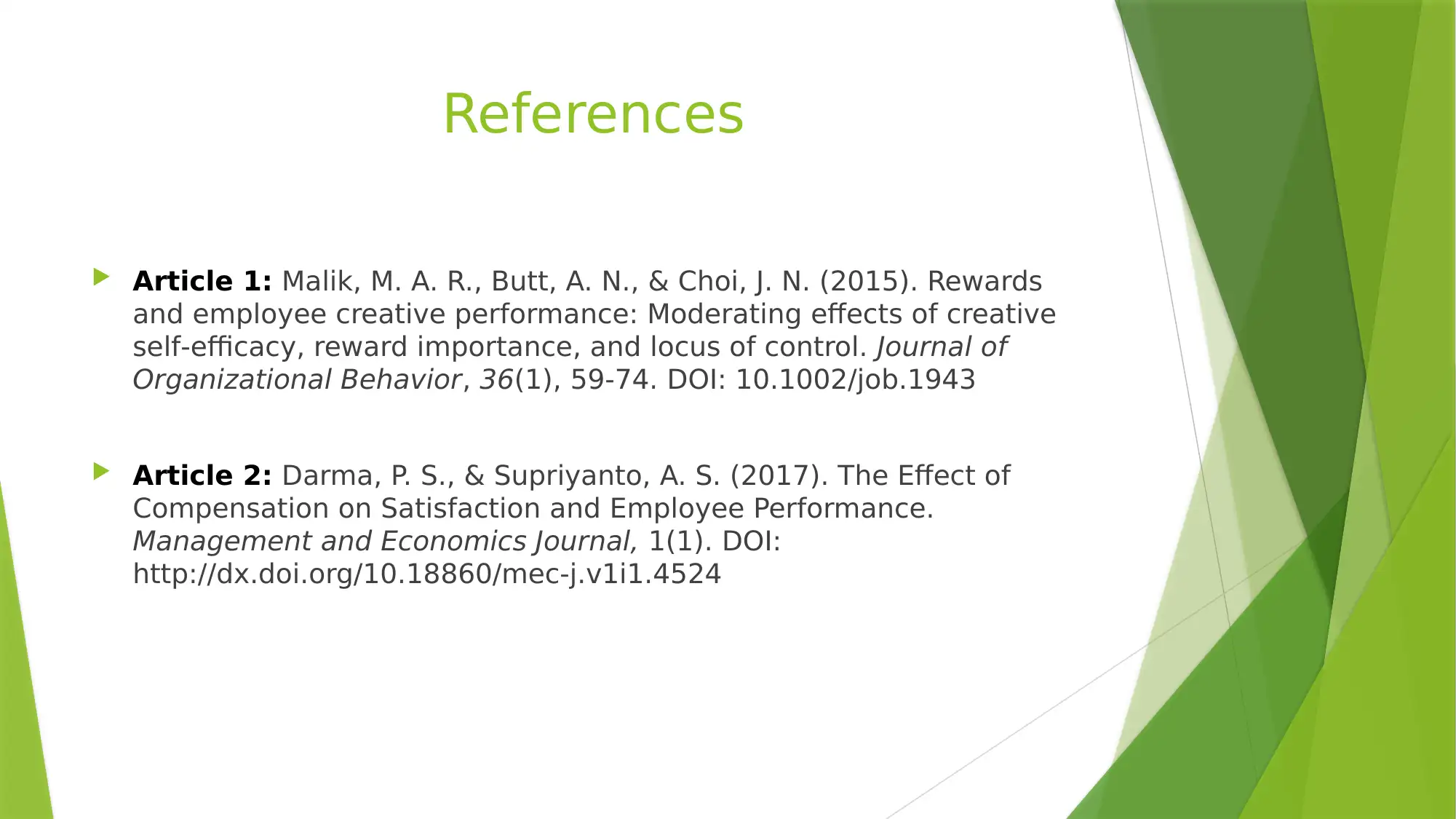
References
Article 1: Malik, M. A. R., Butt, A. N., & Choi, J. N. (2015). Rewards
and employee creative performance: Moderating effects of creative
self‐efficacy, reward importance, and locus of control. Journal of
Organizational Behavior, 36(1), 59-74. DOI: 10.1002/job.1943
Article 2: Darma, P. S., & Supriyanto, A. S. (2017). The Effect of
Compensation on Satisfaction and Employee Performance.
Management and Economics Journal, 1(1). DOI:
http://dx.doi.org/10.18860/mec-j.v1i1.4524
Article 1: Malik, M. A. R., Butt, A. N., & Choi, J. N. (2015). Rewards
and employee creative performance: Moderating effects of creative
self‐efficacy, reward importance, and locus of control. Journal of
Organizational Behavior, 36(1), 59-74. DOI: 10.1002/job.1943
Article 2: Darma, P. S., & Supriyanto, A. S. (2017). The Effect of
Compensation on Satisfaction and Employee Performance.
Management and Economics Journal, 1(1). DOI:
http://dx.doi.org/10.18860/mec-j.v1i1.4524
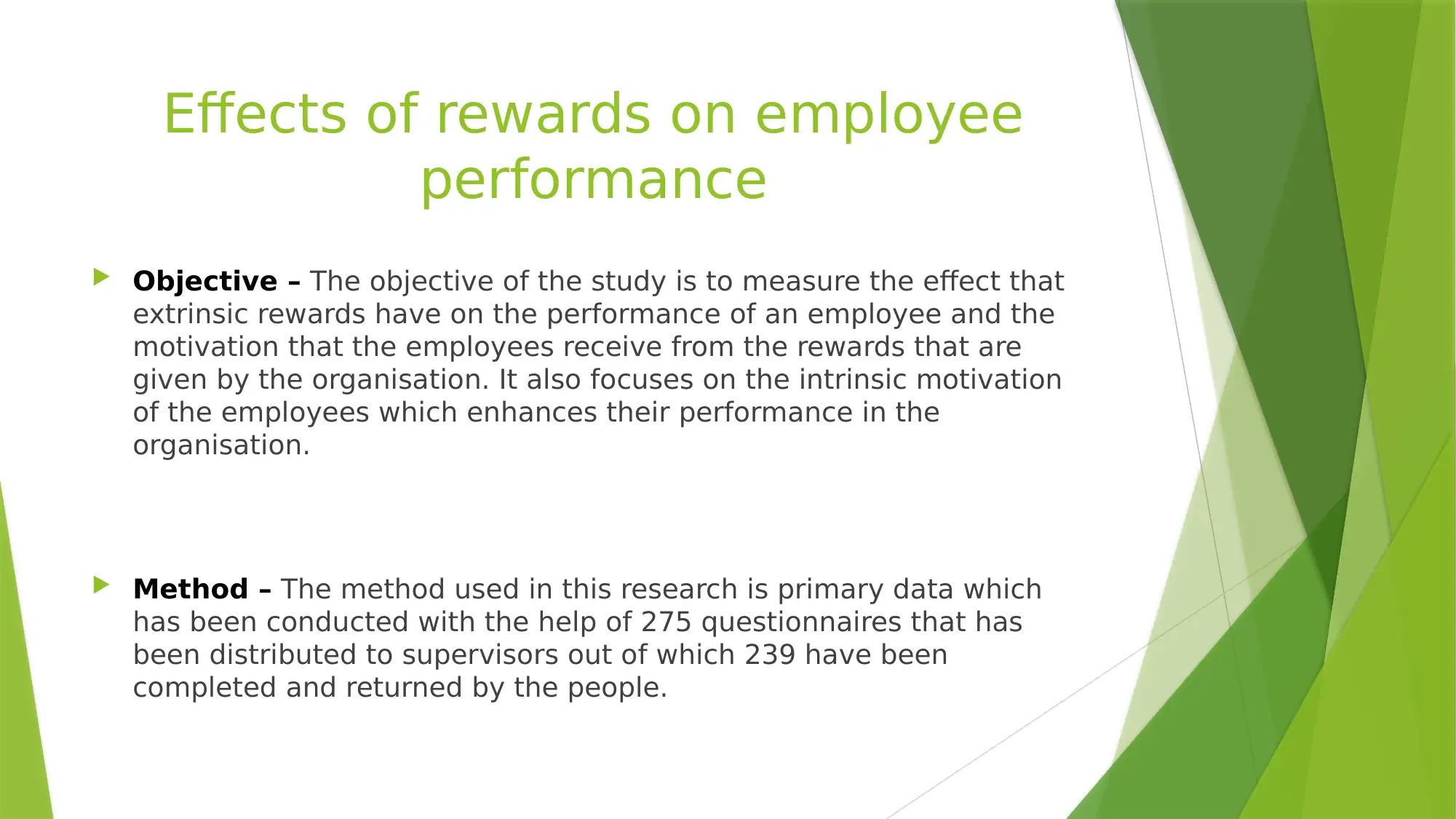
Effects of rewards on employee
performance
Objective – The objective of the study is to measure the effect that
extrinsic rewards have on the performance of an employee and the
motivation that the employees receive from the rewards that are
given by the organisation. It also focuses on the intrinsic motivation
of the employees which enhances their performance in the
organisation.
Method – The method used in this research is primary data which
has been conducted with the help of 275 questionnaires that has
been distributed to supervisors out of which 239 have been
completed and returned by the people.
performance
Objective – The objective of the study is to measure the effect that
extrinsic rewards have on the performance of an employee and the
motivation that the employees receive from the rewards that are
given by the organisation. It also focuses on the intrinsic motivation
of the employees which enhances their performance in the
organisation.
Method – The method used in this research is primary data which
has been conducted with the help of 275 questionnaires that has
been distributed to supervisors out of which 239 have been
completed and returned by the people.
⊘ This is a preview!⊘
Do you want full access?
Subscribe today to unlock all pages.

Trusted by 1+ million students worldwide
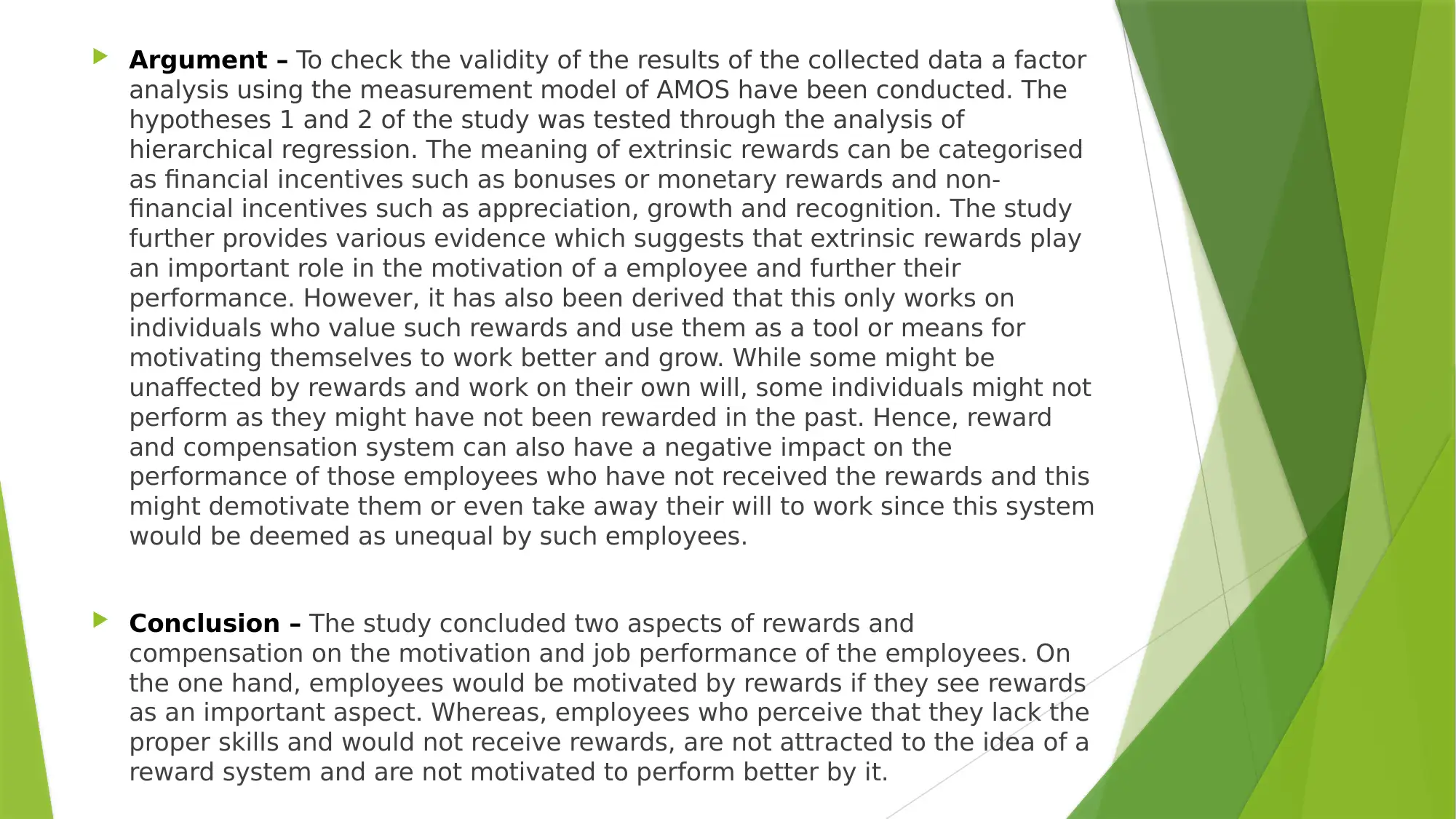
Argument – To check the validity of the results of the collected data a factor
analysis using the measurement model of AMOS have been conducted. The
hypotheses 1 and 2 of the study was tested through the analysis of
hierarchical regression. The meaning of extrinsic rewards can be categorised
as financial incentives such as bonuses or monetary rewards and non-
financial incentives such as appreciation, growth and recognition. The study
further provides various evidence which suggests that extrinsic rewards play
an important role in the motivation of a employee and further their
performance. However, it has also been derived that this only works on
individuals who value such rewards and use them as a tool or means for
motivating themselves to work better and grow. While some might be
unaffected by rewards and work on their own will, some individuals might not
perform as they might have not been rewarded in the past. Hence, reward
and compensation system can also have a negative impact on the
performance of those employees who have not received the rewards and this
might demotivate them or even take away their will to work since this system
would be deemed as unequal by such employees.
Conclusion – The study concluded two aspects of rewards and
compensation on the motivation and job performance of the employees. On
the one hand, employees would be motivated by rewards if they see rewards
as an important aspect. Whereas, employees who perceive that they lack the
proper skills and would not receive rewards, are not attracted to the idea of a
reward system and are not motivated to perform better by it.
analysis using the measurement model of AMOS have been conducted. The
hypotheses 1 and 2 of the study was tested through the analysis of
hierarchical regression. The meaning of extrinsic rewards can be categorised
as financial incentives such as bonuses or monetary rewards and non-
financial incentives such as appreciation, growth and recognition. The study
further provides various evidence which suggests that extrinsic rewards play
an important role in the motivation of a employee and further their
performance. However, it has also been derived that this only works on
individuals who value such rewards and use them as a tool or means for
motivating themselves to work better and grow. While some might be
unaffected by rewards and work on their own will, some individuals might not
perform as they might have not been rewarded in the past. Hence, reward
and compensation system can also have a negative impact on the
performance of those employees who have not received the rewards and this
might demotivate them or even take away their will to work since this system
would be deemed as unequal by such employees.
Conclusion – The study concluded two aspects of rewards and
compensation on the motivation and job performance of the employees. On
the one hand, employees would be motivated by rewards if they see rewards
as an important aspect. Whereas, employees who perceive that they lack the
proper skills and would not receive rewards, are not attracted to the idea of a
reward system and are not motivated to perform better by it.
Paraphrase This Document
Need a fresh take? Get an instant paraphrase of this document with our AI Paraphraser
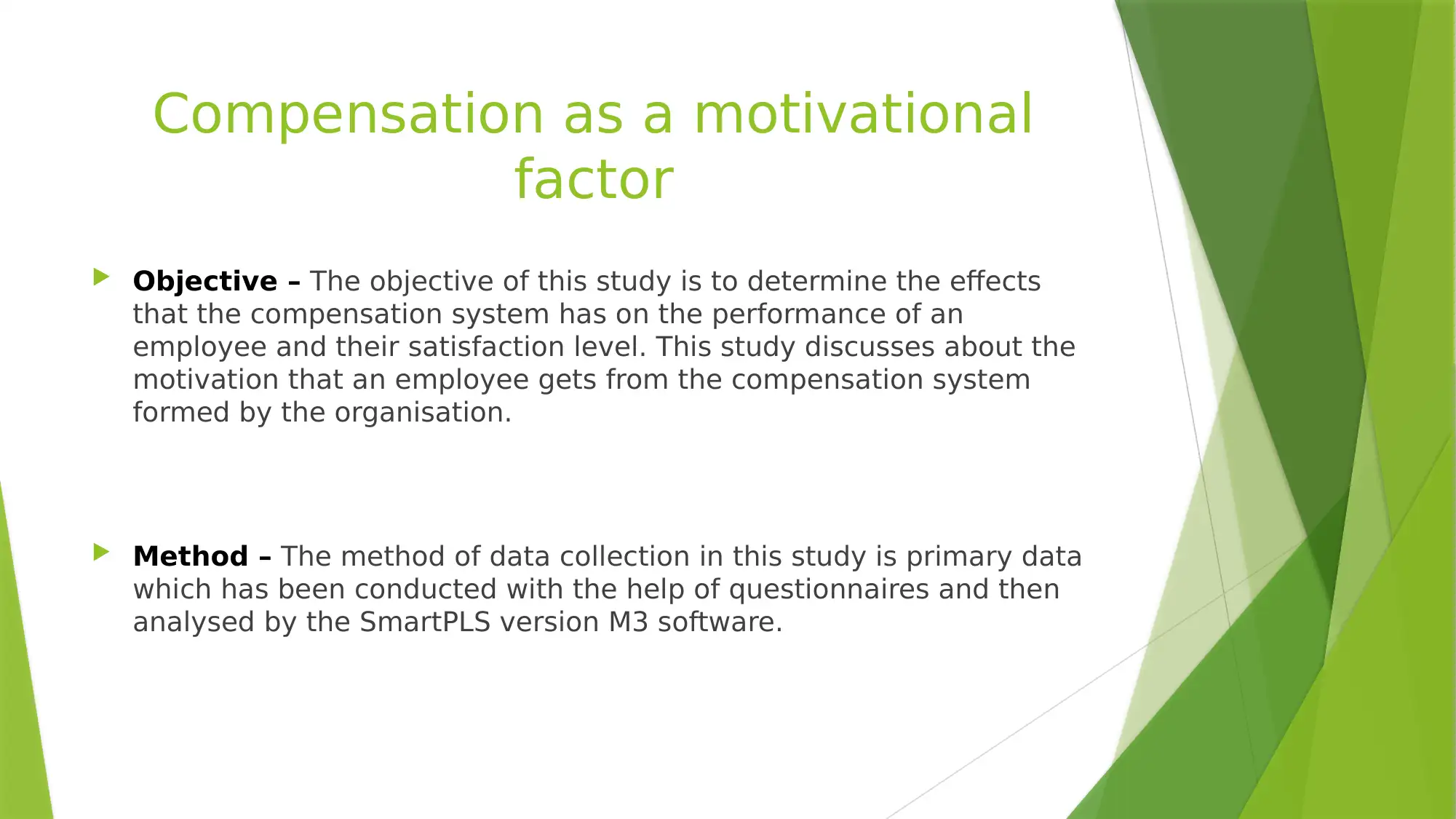
Compensation as a motivational
factor
Objective – The objective of this study is to determine the effects
that the compensation system has on the performance of an
employee and their satisfaction level. This study discusses about the
motivation that an employee gets from the compensation system
formed by the organisation.
Method – The method of data collection in this study is primary data
which has been conducted with the help of questionnaires and then
analysed by the SmartPLS version M3 software.
factor
Objective – The objective of this study is to determine the effects
that the compensation system has on the performance of an
employee and their satisfaction level. This study discusses about the
motivation that an employee gets from the compensation system
formed by the organisation.
Method – The method of data collection in this study is primary data
which has been conducted with the help of questionnaires and then
analysed by the SmartPLS version M3 software.
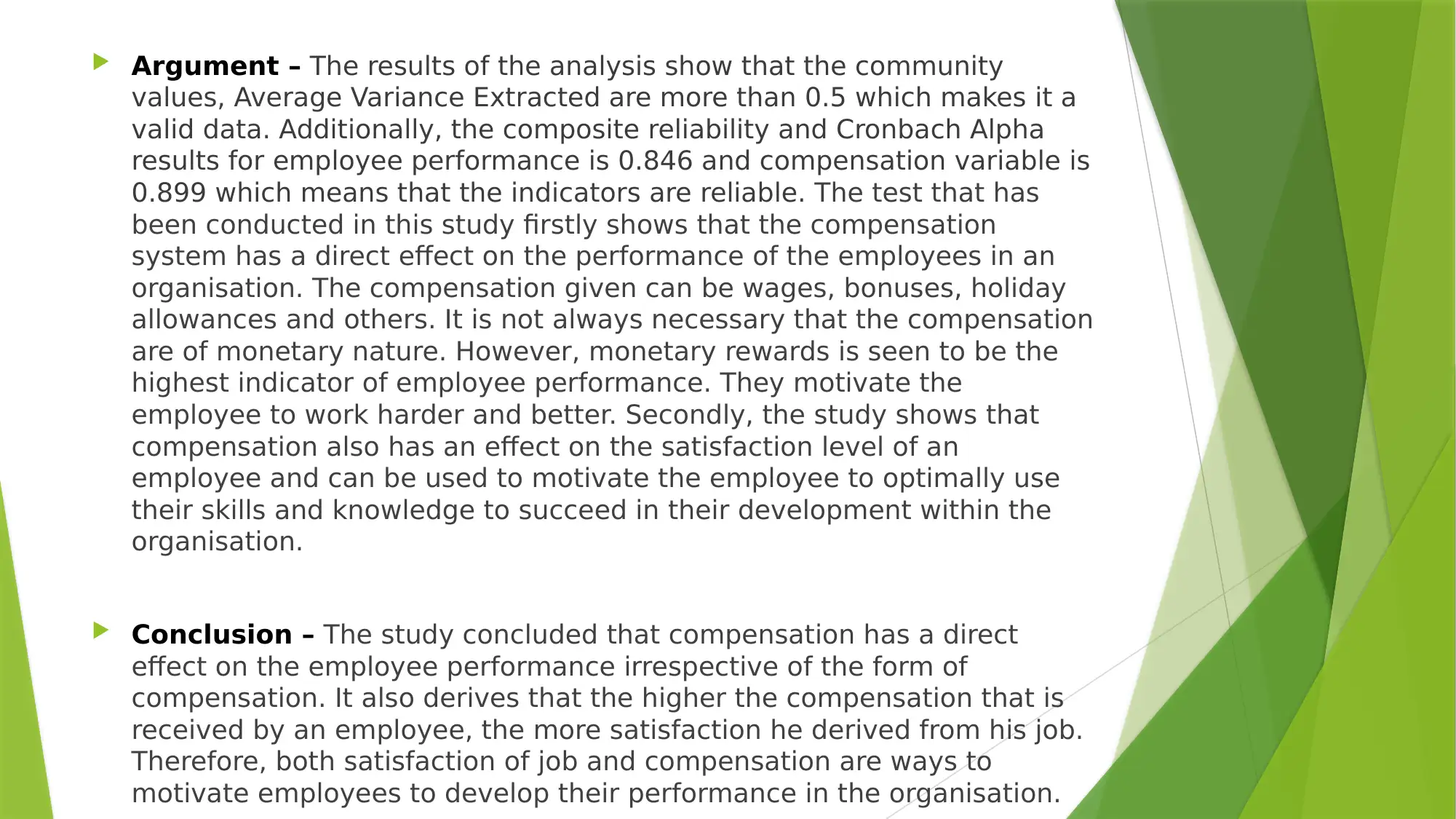
Argument – The results of the analysis show that the community
values, Average Variance Extracted are more than 0.5 which makes it a
valid data. Additionally, the composite reliability and Cronbach Alpha
results for employee performance is 0.846 and compensation variable is
0.899 which means that the indicators are reliable. The test that has
been conducted in this study firstly shows that the compensation
system has a direct effect on the performance of the employees in an
organisation. The compensation given can be wages, bonuses, holiday
allowances and others. It is not always necessary that the compensation
are of monetary nature. However, monetary rewards is seen to be the
highest indicator of employee performance. They motivate the
employee to work harder and better. Secondly, the study shows that
compensation also has an effect on the satisfaction level of an
employee and can be used to motivate the employee to optimally use
their skills and knowledge to succeed in their development within the
organisation.
Conclusion – The study concluded that compensation has a direct
effect on the employee performance irrespective of the form of
compensation. It also derives that the higher the compensation that is
received by an employee, the more satisfaction he derived from his job.
Therefore, both satisfaction of job and compensation are ways to
motivate employees to develop their performance in the organisation.
values, Average Variance Extracted are more than 0.5 which makes it a
valid data. Additionally, the composite reliability and Cronbach Alpha
results for employee performance is 0.846 and compensation variable is
0.899 which means that the indicators are reliable. The test that has
been conducted in this study firstly shows that the compensation
system has a direct effect on the performance of the employees in an
organisation. The compensation given can be wages, bonuses, holiday
allowances and others. It is not always necessary that the compensation
are of monetary nature. However, monetary rewards is seen to be the
highest indicator of employee performance. They motivate the
employee to work harder and better. Secondly, the study shows that
compensation also has an effect on the satisfaction level of an
employee and can be used to motivate the employee to optimally use
their skills and knowledge to succeed in their development within the
organisation.
Conclusion – The study concluded that compensation has a direct
effect on the employee performance irrespective of the form of
compensation. It also derives that the higher the compensation that is
received by an employee, the more satisfaction he derived from his job.
Therefore, both satisfaction of job and compensation are ways to
motivate employees to develop their performance in the organisation.
⊘ This is a preview!⊘
Do you want full access?
Subscribe today to unlock all pages.

Trusted by 1+ million students worldwide
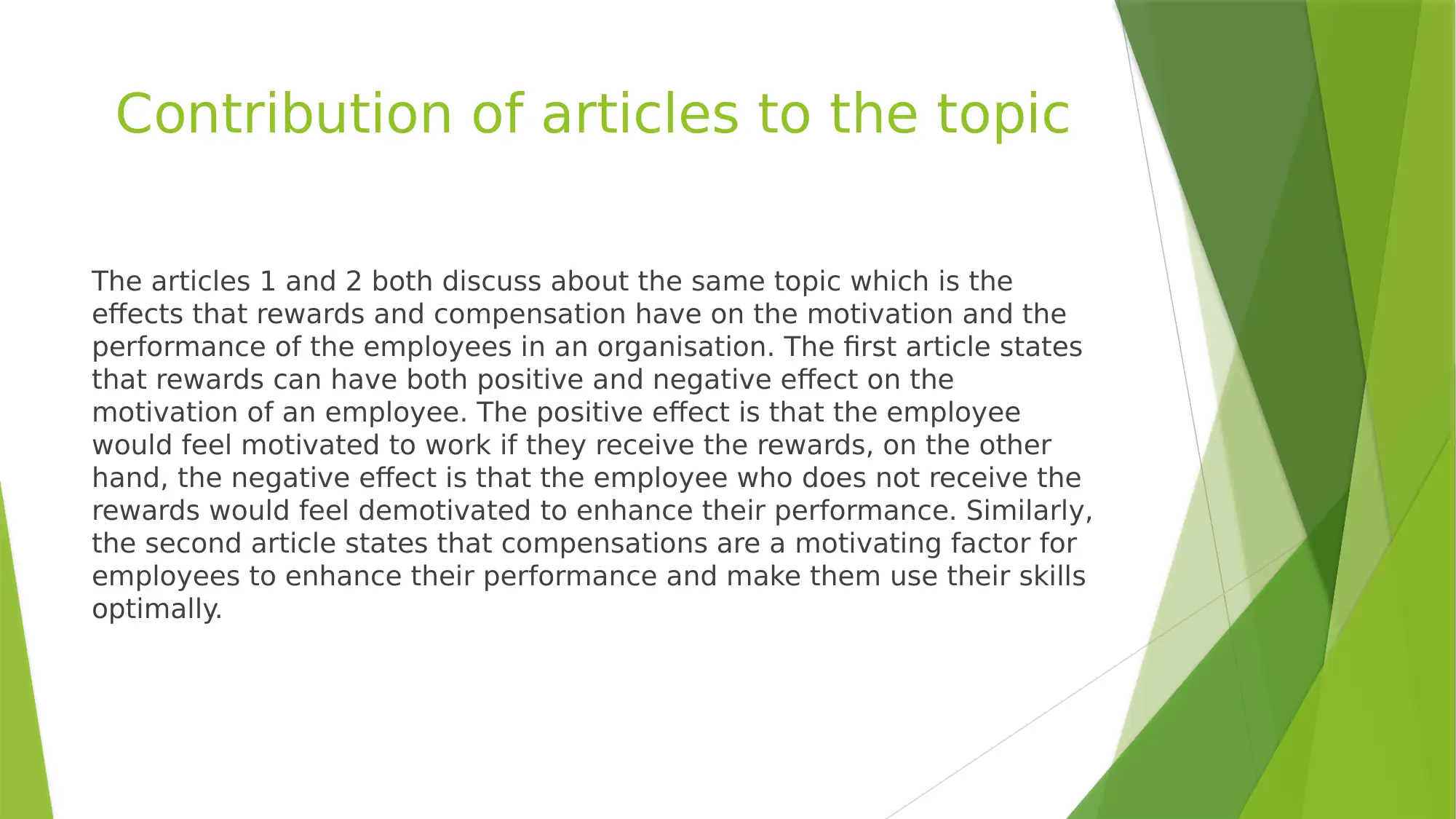
Contribution of articles to the topic
The articles 1 and 2 both discuss about the same topic which is the
effects that rewards and compensation have on the motivation and the
performance of the employees in an organisation. The first article states
that rewards can have both positive and negative effect on the
motivation of an employee. The positive effect is that the employee
would feel motivated to work if they receive the rewards, on the other
hand, the negative effect is that the employee who does not receive the
rewards would feel demotivated to enhance their performance. Similarly,
the second article states that compensations are a motivating factor for
employees to enhance their performance and make them use their skills
optimally.
The articles 1 and 2 both discuss about the same topic which is the
effects that rewards and compensation have on the motivation and the
performance of the employees in an organisation. The first article states
that rewards can have both positive and negative effect on the
motivation of an employee. The positive effect is that the employee
would feel motivated to work if they receive the rewards, on the other
hand, the negative effect is that the employee who does not receive the
rewards would feel demotivated to enhance their performance. Similarly,
the second article states that compensations are a motivating factor for
employees to enhance their performance and make them use their skills
optimally.
Paraphrase This Document
Need a fresh take? Get an instant paraphrase of this document with our AI Paraphraser

1 out of 8
Related Documents
Your All-in-One AI-Powered Toolkit for Academic Success.
+13062052269
info@desklib.com
Available 24*7 on WhatsApp / Email
![[object Object]](/_next/static/media/star-bottom.7253800d.svg)
Unlock your academic potential
Copyright © 2020–2026 A2Z Services. All Rights Reserved. Developed and managed by ZUCOL.





